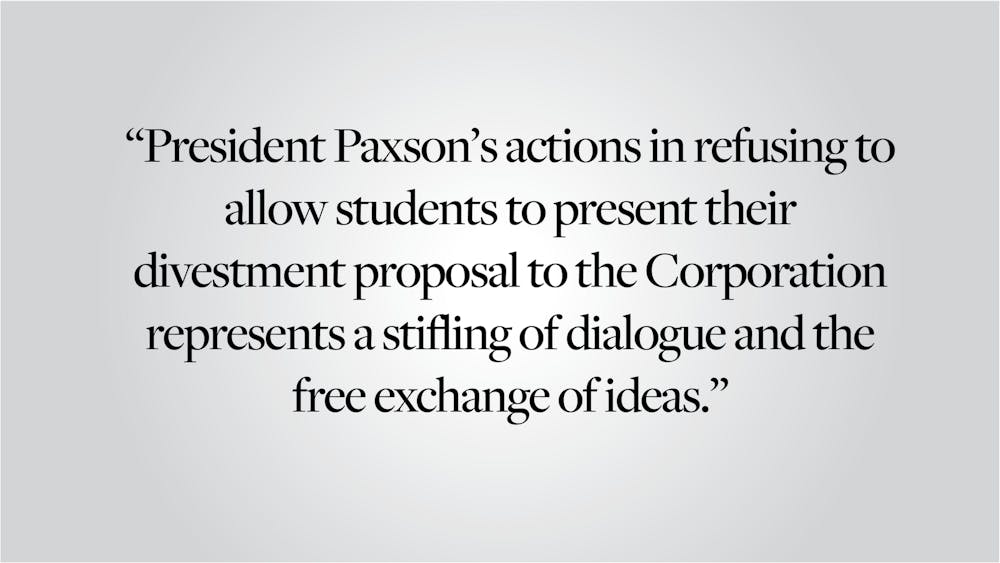Editor’s note: This op-ed was signed by a group of 85 alums. The full list of signatories is linked at the bottom of this op-ed.
We, alumni from three generations of Brown students going back to the 1960s, are writing to express our support for the 19 courageous students — including Jews and Palestinians — who are on a hunger strike. The request of the hunger strikers is simple and reasonable: for President Paxson to include a proposal for divestment from 10 manufacturers of military weapons, supplies and telecommunications on the agenda of the Corporation meeting taking place on Feb. 8 and 9, and to allow undergraduate representatives to present to the Corporation the report of the Brown University Committee on Corporate Responsibility in Investment Practices and its addenda.
The administration of President Paxson refuses to permit the students to present the divestment proposal to the Corporation. At the least, the refusal to allow students to present their divestment proposal — at a time of tragic international upheaval which has come home to Brown in the form of a Palestinian student, Hisham Awartani, suffering life-altering injuries as the result of a violent attack — represents a lack of respect for students who are acting in a principled and nonviolent manner.
The administration of Brown University is acting in a uniquely draconian manner. Those of us who protested University complicity in the Vietnam War in the 1960s dealt with an administration which — although largely disagreeing with what we were requesting — treated us with respect. Brown’s treatment of student protesters in those days contrasted with other universities such as Columbia, which treated its students with contempt.
Those of us who participated in student protests at Brown in later generations were not blocked from simple acts such as presenting our proposals to the Corporation. Indeed, as recently as May 23, 2013, when some of us mounted a campaign seeking the divestment of Brown University investments from fossil fuels, we were permitted to present our proposal to the Corporation.
The request of students to present their proposal for divestment at the Corporation meeting does not arise in a vacuum. In 2020, the Advisory Committee of Corporate Responsibility on Investment Policies, which had been appointed by President Paxson, issued a report which recommended withdrawal of University investments from companies identified as facilitating human rights violations in Palestine. This report, as well as its subsequent modifications, was rejected by President Paxson for the reason that it failed to explain “how financial divestment from the entities would address social harm as defined in the committee charge.”
The students in the hunger strike and their supporters have written a document which addresses President Paxson’s position on divestment. The Corporation should at least be given the opportunity to consider it.
In our view, President Paxon’s articulation of the basis for rejection of ACCRIP’s recommendation represents bureaucratic obfuscation, at best. The “social harm” addressed by the Committee in 2020 pales beside the immediate situation of the unnecessary deaths of tens of thousands of Palestinian civilians and the wholesale destruction of Gaza. Is President Paxson contending that the destruction of Gazan hospitals and schools, and the interference with aid reaching starving Palestinians, does not represent “social harm”?
As for whether divestment from the identified companies would “address” the social harm, Brown has a rich history of divestment precedents including from investments directly related to South Africa in 1986, tobacco in 2003 and Sudan in 2006, as well as the functional divestment from fossil fuels in 2020. President Paxson has failed to articulate any distinction between these four instances of divestment and the present request of students.
Other recent actions by President Paxson similarly illustrate her rejection of Brown’s traditions and precedents. In December she called onto the Brown campus the Providence Police to arrest 41 students for the “crime” of peacefully sitting in at University Hall past the normal closing time of 5 p.m. Yet she now bars from the Brown campus journalists who wish to speak with the hunger strikers.
The Brown University we know and love stands for dialogue and the free exchange of ideas. President Paxson’s actions in refusing to allow students to present their divestment proposal to the Corporation represents a stifling of dialogue and the free exchange of ideas. The Corporation may reject the divestment proposal, but it should be allowed the opportunity to hear from these students and consider what they have to say.
Signatories: Link here





